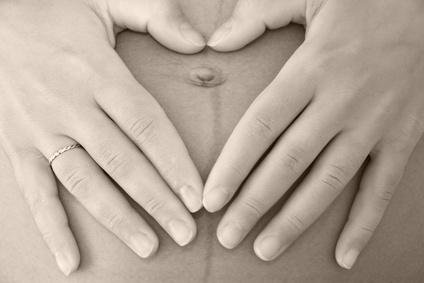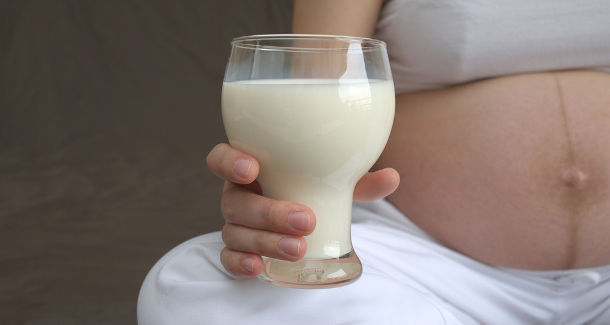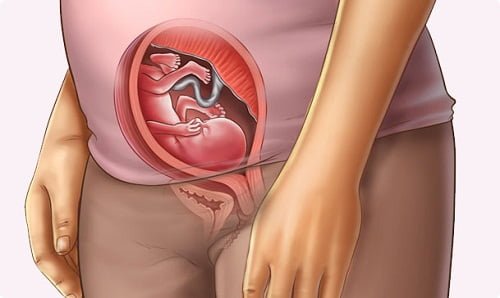At three weeks pregnant, you are approximately 5 to 7 days away from starting your menstrual period. During the third week of pregnancy, your baby is considered a blastocyst, a small cluster of rapidly dividing cells. At the end of this week, your blastocyst will attach to your uterine wall lining and become an embryo. Also during this time, your pregnancy hormones (HCG) will double or triple every 48 to 72 hours. The excess HCG (human chorionic gonadotropin ) will be detectable in your urine and may test positive for pregnancy.
You may or may not experience pregnancy symptoms during this time – it really depends on how sensitive you are to bodily changes and how much HCG has accumulated in your body. If you are wondering what to expect during your third week of pregnancy then this article can tell you everything you want to know.
How Can I Find Out If I Am 3 Weeks Pregnant?
If you think you may be three weeks pregnant, then it is important that you find out for sure as soon as possible. It is best to start prenatal care sooner rather than later. You can determine if you are indeed three weeks pregnant by knowing the common signs of pregnancy and looking for any signs that signal that you have conceived.
You can test two weeks early (before your next menstrual period) with a doctor-ordered blood test or you can test six days early with an at-home, urine-based early pregnancy test. It is important to note that in some instances a three week pregnancy may not be detectable on a blood or urine test until a week or two after a missed period.
- Take a pregnancy test: If you think you are three weeks pregnant it is important that you purchase and take a urine or blood pregnancy test. A sensitive, early, at-home urine-based pregnancy test may detect your pregnancy sooner than a urine-based pregnancy test administered at your doctor’s office. The most reliable way to detect an early pregnancy is through a doctor-ordered, blood-based pregnancy test. You will need to be at least two weeks past ovulation/conception to get accurate pregnancy results.
- Schedule an OBGYN visit: Schedule an appointment with a gynecologist or obstetrician and ask him/her for a blood test and/or urine test to determine pregnancy. If you are pregnant, a blood test can help determine how far along you are. Moreover, blood tests may detect an early pregnancy approximately 3 weeks after your last menstrual period or 7 days after conception.
• Be aware of your symptoms: Make a mental note or document any early pregnancy symptoms that you have. You may notice that you suddenly have tender breasts, get nauseous really easily, are more tired than usual and/or crave foods that you used to hate. Do not be alarmed if you do not experience any early pregnancy symptoms – that is also normal. In fact, you may not experience pregnancy symptoms until later in your pregnancy, if at all.
Considerations:
A missed period can be a good indicator of pregnancy, but it is not 100% reliable all of the time. There are many reasons why your period may be late, some of which include: a hormonal imbalance, stress and/or medical condition. For these reasons, a missed period is not enough to officially confirm a pregnancy. If you decide to try an at-home pregnancy test, be aware that there is a chance of false positives and false negatives.
If you get a negative on the at-home pregnancy test and you still believe you are at least three weeks pregnant, wait approximately 72 hours and take another test. You may be testing too soon or the test may be defective. Although many at-home pregnancy tests tout a 100% accuracy rate, some pregnancy tests may not have the sensitivity levels to detect very low levels of HCG in your urine.
How Will My Life Change at Three Weeks Pregnant?
During conception, a sperm breaks through your egg’s strong outer membrane and fertilizes it. Once the egg has been fertilized, it burrows into your uterine lining and starts the process of development. During the third week of pregnancy, you may notice pink, red, light brown, tan or orange spotting on the toilet paper after urinating or defecating.
You may also notice small amounts of spotting on your underwear. This type of bleeding is called “implantation spotting or implantation bleeding.” When your fertilized egg burrows into your uterine lining’s rich blood supply, it can cause spotting and/or light bleeding (Knapp, 2013).
What Signs and Symptoms Will I Experience At Three Weeks Pregnant?
At three weeks pregnant, you may or may not experience pregnancy symptoms. It depends on your hormone levels and your sensitivity to changes in your body. According to the American Pregnancy Association, (2013), following symptoms are associated with early pregnancy:
-
Fatigue
Are you more tired than normal? If the answer is “yes,” you may be three weeks pregnant. Fatigue can arise during your third week of pregnancy. An increased production of hormones (progesterone, HCG and estrogen) can cause you to feel sleepier and more tired than usual. You can ward off early-pregnancy fatigue by getting at least 8 hours of sleep each night. In addition, if you find yourself getting tired during the middle of the day, take a midday nap. Napping will help you feel revitalized.
-
Implantation Spotting, Bleeding and Cramping
Have you been spotting, light bleeding and/or cramping this past week? If you have than there is a chance you may be three weeks pregnant. Implantation spotting and bleeding, along with cramping may occur during your third week of pregnancy. A fertilized egg typically implants itself into your uterine wall, approximately six to twelve days after conception.
When this occurs, it can cause cramping, spotting and/or light bleeding. Implantation spotting and bleeding is normally lighter in frequency, color and intensity than your normal menstrual period and it typically occurs a few days before you are due to start your period. It is important to note that not all women experience implantation spotting, bleeding or cramping.
-
Swollen and Tender Breasts
If you are three weeks pregnant you may notice that your breasts have increased in size. They may also be tender and slightly painful. You may mistake your swollen and tender breasts for signs of PMS (pre-menstrual syndrome) or an impending period, but in actuality you may be three weeks pregnant.
Breast tenderness and swelling occurs as a result of increasing hormone levels (progesterone, HCG and estrogen). They also swell in preparation for future breastfeeding sessions. You may also notice that your areola (the dark, circular area around your nipples) have increased in size and darkened. Moreover, you may notice blue-green veins crisscrossing your breasts.
-
Nausea
If you are indeed three weeks pregnant, you may experience acute or chronic bouts of nausea. This symptom occurs as a result of rising estrogen levels. During this time, you may also develop a sensitivity or aversion towards certain foods and/or odors (air fresheners, perfumes, colognes, cigarette smoke, gasoline, bacon, red meat, etc.) that cause you to become nauseous.

-
Frequent Urination
You may begin to experience frequent urination as early as three weeks pregnant. This symptom worsens as your hormone levels increase and your uterus expands to accommodate your growing baby. As your uterus enlarges, it places excess pressure on your bladder, which causes you to urinate more frequently.
-
Increased Blood Flow
During your third week of pregnancy, you may experience an increase in blood flow. As your hormone levels increase, the amount of blood your body produces also increases. The sudden influx of blood can cause dizziness, light-headedness and/or headaches. Do not be alarmed if you suddenly feel wobbly when you stand up too quickly or shaky when you get too hungry. If you feel yourself becoming dizzy, eat a small snack like an orange and/or lay down until you feel strong enough to get up and move around.
What Happens with the Baby at Three Weeks Pregnant?
According to the educational pregnancy website, What to Expect (2013), your developing baby is a tiny cluster of cells (blastocyst). These cells are constantly multiplying and dividing. Once the blastocyst implants into your uterus, part of it will develop into the placenta, which will be used to transport nutrients, blood and oxygen to your growing baby. Moreover, during this time, your body begins to produce and increase its levels of HCG, estrogen and progesterone.
These hormones not only signal to your ovaries to stop releasing eggs, they also help your baby grow and prevent your uterus from prematurely shedding its lining. You will typically receive a positive on a pregnancy if you have at least 15-25 HCG hormones in your urine and blood. Also during the third week of pregnancy, amniotic fluid begins to form around the cells that will eventually become your baby’s amniotic sac. This fluid provides a cushion around your growing baby that protects him/her from harm. It is important to note once your blastocyst attaches to your uterine wall it becomes an embryo.
At this stage in your pregnancy, your little embryo receives nutrients and oxygen and discards waste through a simple circulation system consisting of tiny tunnels that connect him/her to blood vessels in your uterus. The placenta will not be fully formed until the end of your fourth week of pregnancy. It is important to remember that babies develop on their own schedule, even before birth. This information provides you with a general explanation of what happens with your baby during week 3.
What Foods Should I Eat At Three Weeks Pregnant?
Your growing baby depends on your for his/her nutrients so it is important that you receive enough “baby-nourishing” foods during your third week of pregnancy, according to the Mayo Clinic (2013). The foods listed below contain the essential nutrients needed to ensure that your baby properly develops.

- Dairy Products: Dairy products (milk, cheese, yogurt, etc.) contain large amounts of calcium, which is important for bone, cartilage, tendons and ligament development. Calcium also protects your baby’s tiny bones from breaks. Other foods that contain calcium include: tofu, soy, green leafy vegetables (spinach, kale, and collard greens), broccoli, salmon and fortified juices. Your baby needs an adequate amount of calcium to properly grow and develop so it is important that you consume at least three servings of calcium a day.
- Whole Grains: Whole grains are rich in magnesium, which relaxes your uterine muscles so that your uterus does not prematurely contract. It is also prevents irregular heart rates, builds strong teeth, aids in bone development and regulates insulin and blood sugar levels. Consuming approximately 2 mg of magnesium a day can help prevent early miscarriages and premature deliveries. Other foods that contain a healthy amount of magnesium include: carrots, spinach, broccoli, bananas, raisins and nuts.
- Oatmeal: Oatmeal is a zinc-rich food that aids in cellular growth, strengthens immune system function and helps repair organ and tissue damage. It also plays a part in developing your sense of taste and smell. A zinc deficiency can cause a variety of medical conditions for you and your baby such as: miscarriages, toxemia and low-birth weight. You can protect your growing baby from these ailments by adding zinc-based foods into your daily diet. The following foods can help you receive the 15 mg of zinc you need daily to ensure a healthy pregnancy – chicken, lean beef, pork, corn, eggs, yogurt, almonds and beans.
- Citrus Fruits: Citrus fruits contain healthy amounts of folic acid, which is crucial for your baby’s growth and development. Folic acid protects your baby from developing birth defects like Spina bifida and low-birth weight and it also helps develop your baby’s spinal cord. Other foods that contain folic acid include: kale, nuts, spinach, mustard greens, collard greens and fortified orange juice.
What Exercises Can I Safely Do During My Third Week of Pregnancy?
You probably have not gained a lot of weight by your third week of pregnancy in fact you may be suffering from nausea, which prevents you from eating like you normally would. If you feel like you are gaining too much weight too quickly or you are used to working out on a regular basis, there are some exercises that you can do during your third week of pregnancy. It is important to note that weight gain during pregnancy is unavoidable, but that does mean that the weight gain has to be permanent.
If you are good condition and you already exercise regularly, then pregnancy should not stop you from safely exercising. “Safe exercises” that you can perform during your third week of pregnancy include: walking, swimming and/or aerobics. It is important to contact your doctor before starting a new exercise routine (University of Maryland Medical Center, 2013).
References:
American Pregnancy Association. (2013). Pregnancy symptoms-Early signs of pregnancy. Retrieved from http://americanpregnancy.org/gettingpregnant/earlypregnancysymptoms.html
Knapp, J. (2013). Your changing body week-by-week: Week 3. Parents. Retrieved from http://www.parents.com/pregnancy/week-by-week/your-changing-body/?page=3#page=3
Mayo Clinic. (2013). Pregnancy diet: Focus on these essential nutrients. Retrieved from
http://www.mayoclinic.com/health/pregnancy-nutrition/PR00110
University of Maryland Medical Center. (2013). Exercise during pregnancy. Retrieved from
http://umm.edu/health/medical/pregnancy/staying-healthy-during-pregnancy/exercise- during-pregnancy
What to Expect. (2013). Week 3 of pregnancy. Retrieved from http://www.whattoexpect.com/pregnancy/3-weeks-pregnant.aspx
